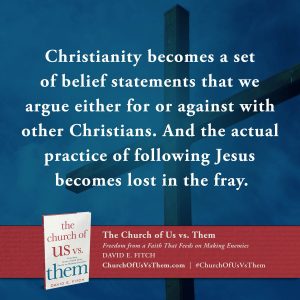 Over the last several years, I’ve gotten more and more distressed by social media, like Facebook and Twitter. I’m as snarky as the best of them, but it’s flown way beyond sarcastic. It can only be described as hate-filled.
Over the last several years, I’ve gotten more and more distressed by social media, like Facebook and Twitter. I’m as snarky as the best of them, but it’s flown way beyond sarcastic. It can only be described as hate-filled.
Someone posts something that reflects their political or social issue view; people react. They don’t simply state their contrary opinion, they get nasty. They call names. They purposefully miss the point, so they can create more drama. And to be fair, occasionally the culprit might be me.
No opinions are changed. Everyone simply digs in behind their defenses, shooting missiles at the enemy. And enemies is what anyone we disagree with has become.
 In the past few months I’ve become even more appalled as I’ve watched Christians maul each other on Twitter. A Christian author who skews progressive became seriously ill, was in a coma, and her family asked for prayer. While many prayed, others pounced. Because of her views on homosexuality, it didn’t matter that she deeply loved Jesus. Fellow Christians tweeted that they hoped she repented before she ended up in hell, along with all her followers. I can’t imagine how anyone can think that could ever be appropriate when someone’s family asks for prayer. But those who hated her felt they could say it again when she died: “Now that she’s in hell, she’s knows she was wrong.”
In the past few months I’ve become even more appalled as I’ve watched Christians maul each other on Twitter. A Christian author who skews progressive became seriously ill, was in a coma, and her family asked for prayer. While many prayed, others pounced. Because of her views on homosexuality, it didn’t matter that she deeply loved Jesus. Fellow Christians tweeted that they hoped she repented before she ended up in hell, along with all her followers. I can’t imagine how anyone can think that could ever be appropriate when someone’s family asks for prayer. But those who hated her felt they could say it again when she died: “Now that she’s in hell, she’s knows she was wrong.”
I grieved that Christians could be so hate-filled.
I grieved for those who don’t know Jesus yet, watching the carnage and wondering why anyone would want to be a Christian if this is how they act, how they destroy their own kind.
 A month or two later, a famous conservative woman Bible teacher was asked by a pastor to deliver the Sunday morning sermon at a Baptist church. The conservative Twitterverse went into overdrive, hurling vindictives, asking leadership to “rein her in,” digging through everything she had ever written and watching 12-year-old videos to try to find reasons to prove her a heretic. The screaming moved from accusation to accusation, demanding explanations that left her feeling like she was losing a game of whack-a-mole.
A month or two later, a famous conservative woman Bible teacher was asked by a pastor to deliver the Sunday morning sermon at a Baptist church. The conservative Twitterverse went into overdrive, hurling vindictives, asking leadership to “rein her in,” digging through everything she had ever written and watching 12-year-old videos to try to find reasons to prove her a heretic. The screaming moved from accusation to accusation, demanding explanations that left her feeling like she was losing a game of whack-a-mole.
I grieved that Christians could be so hate-filled.
I grieved for those who don’t know Jesus yet, watching the carnage and wondering why anyone would want to be a Christian if this is how they act, how they destroy their own kind.
 So when I was offered a copy of David Fitch’s new book—The Church of Us vs. Them: Freedom from a Faith That Feeds on Making Enemies—to review, I jumped on it. The church needs a better way.
So when I was offered a copy of David Fitch’s new book—The Church of Us vs. Them: Freedom from a Faith That Feeds on Making Enemies—to review, I jumped on it. The church needs a better way.
This is no “Let’s all just get along” book. The call to move beyond enemy-making into opening up space for God to work requires sacrifice, a reimagining of how we interact with Scripture, of what conversion fully entails, of how to be the church in the world. The book requires an attention to the process Fitch is laying out. I think, for me at least, the book will require an immediate second reading to fully grasp how my thinking and posture need to change.
My wish is that church communities would read this book together, discussing Fitch’s propositions and talking honestly about what it would take for their church to move beyond making enemies. I don’t have a lot of hope for that.
 But maybe we who do read it can prayerfully ask the Spirit of God to change our hearts so our words and our choices reflect his Kingdom.
But maybe we who do read it can prayerfully ask the Spirit of God to change our hearts so our words and our choices reflect his Kingdom.
The book explains how slogans and banners are vital to the enemy-making machine. “It extracts the enemy from relationship and makes them into an object around which we gather fear and loathing.” And so slogans and banners must be laid down at the cross of Jesus.
Instead, can we move out into the world, listening, being present in another’s pain, suffering, and guilt and, as Fitch says, “when the time is right, … proclaim ‘I believe God is working in you to ______________. Can you see this too?'”
 This sounds like a more hopeful way forward. I can’t imagine anyone wanting to know our Jesus when we are screaming at them that they’re headed for hell, telling them how vile they are.
This sounds like a more hopeful way forward. I can’t imagine anyone wanting to know our Jesus when we are screaming at them that they’re headed for hell, telling them how vile they are.
“Each time we play into the sick glee of winning an argument,” Fitch says, “we lose the space for the presence of Jesus Christ to work in our lives.” Fitch talks much of making space for God to work. It requires putting aside our certainty in our own rightness, our arrogance and feelings of superiority, our defensiveness and fear. It means recognizing Jesus as Lord of all the earth, at work everywhere.
Fitch sees hope if we develop this new way of being:
“Can we be used by God to bring his healing,
transforming power into the world?”
I pray it might be so.
I received a copy of The Church of Us vs. Them from Brazos Press, but the opinions are my own.
Having Christian and non-Christian friends on both sides of the political spectrum, I choose to post nothing political for fear of a maelstrom of comments from both. I so appreciated your post and will make this book a TBR which I only learned today meant To Be Read.
Thanks, Ellin, for taking the time to comment. It is hard to know what to say and where. I posted something on Monday on a social media site that I spent more than an hour crafting so I could get the words right so I would be heard without antagonizing. I asked for no comments, said I would delete them, and one guy continued to push and to post nasty stuff, so I finally had to block him, which broke my heart.
We certainly need to hear this and practice it today, social media can be so harmful. Follow Christ’s example.
Yes, it can be harmful. But it can also help the powerless and vulnerable find others like themselves and those who will advocate for them. If we followed Christ’s example, as you said, Rose, we would remember that words matter and choose more carefully—and we would put more effort into personal relationships.
I don’t know what to say except for Amen! For those of us who are of the more conservative bent and see what’s seeped into various churches and denominations, our response should only be kindness and prayer.
The trend over the past 15-20 years has even been to change church names from First Baptist, Community Presbyterian, etc. to something more “welcoming” because of despicable things said and done “in the Name of Jesus.” Interestingly, this has coincided with the advancement of social media and the internet.
I’m not backing down a bit from the pure truth of God’s Word. But loving my lgbtq friends (and those who attend local churches who celebrate those lifestyles and other quasi-biblical beliefs) and caring for them as I would anyone else, is going to make more inroads than shunning or criticizing. And when the floor has fallen out, I’ve never had one of these friends refuse when I’ve asked if my church or small group could pray for them or tangibly help.
When I was teaching in public school, a few liberal colleagues would frequently refer families in-need to my church for practical and spiritual help. I’d like to believe that was because the few of us from there who were on-staff never showed anything but compassion toward everyone. And when the conversation turned nasty in the faculty room, we would silently pray—or ask a non-threatening question that would cause people to think, or even change the course of the discussion.
This isn’t the same world as it was even 10 years ago. But the only solution is for us to be more like Jesus, and to be bold—but with love and not animosity. With the people Jesus hung out with, some conservative churches today might sadly pull His membership.
I love this, Maryanne—“be bold—but with love and not animosity”! Yes! It makes such a difference. I am saddened by the many people who tell me they want nothing to do with the church—and even Jesus—because of the way his followers speak and act.
Can’t wait to read it. The political divide has divided our churches and I am so disheartened by it. Thank you for your thoughtful commentary.
Yes, it’s so hard to watch what is happening, Joanna. Something needs to change.
These are confusing times. To be a “good” Christian man today, I must embrace homosexual Christians, recognize abortion at any time as a right of women, call Muslims my brothers because we worship the “same God,” call for open borders and refute penal substitutionary atonement because blood of picturing the blood of Christ washing away sins is violent and icky. It seems to me that rather than being the church in the world we are headed toward being the church of the world. If pointing people toward salvation is seen as divisive, why do we need a church? Charities do a better job of helping people with physical and material needs.